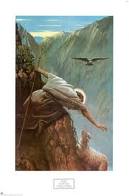Matthew 3_1-12 Rewards points
Most of us have one or more of these. (show a rewards card). The idea of a rewards card is to buy certain products or pay for purchases using the card, earn enough points to exchange them for a reward. A rewards card works best when used often. The more we use the card, the more certain we are of getting a reward, like air tickets, bonus fuel vouchers or whatever your rewards card offers. Christmas is an ideal time to ensure we meet our rewards requirements; to use our credit card to the max; to flash the fly buys card in participating shops; to purchase only products that give us the most bonus points, so that we can be sure of our reward. It’s a great system, nothing wrong with it as long as we don’t make the mistake of purchasing for the sake of getting a reward.
We are transactional people; it makes sense to us. I do this for you, you give me a reward. I spend money, you give me what I want. Christmas gift giving reveals our transactional behaviour. Think about it. How do you feel and what has your response been, when you received a gift from someone you didn’t expect, and had nothing in return to give them? I can tell you now, you would have squirmed, felt uncomfortable, perhaps blushed and even excused yourself with a whole lot of fast talking, for not being able to give a gift in return. We are transactional people, its how we function in the world.
John the Baptist was offering a gift. In the waters of the Jordan, John was baptising people for the forgiveness of sin as a gift from God, apart from and free from any of the religious duties demanded by the ruling religious leaders of their day. “Repent, for the kingdom of heaven is near,†was the message and many people throughout the region heeded the Baptist’s call and were baptised. For doing nothing more than receiving the good news that God’s kingdom was near, and allowing themselves to be baptised, they were rewarded with the gift of the cleansing of their sins. There was no transaction made, God was giving it all and there was nothing to give back in response. There was no trans – just action on God’s part.
When the Sadducees and Pharisees came to do likewise, to be baptised by him, John, in typical prophetic style calls out, “You brood of vipers! Who warned you to flee from the coming wrath? Produce fruit in keeping with repentance.â€Â Why, if baptism is a gift from God for the forgiveness of sins, does John scold the religious leaders for coming out?
John knew they were the great religious-transactors, that’s why. As Jews and descendants of Abraham, they were given the very words of God, the Ten Commandments, and were given the promise that a saviour and king would come from their Father Abraham, as Isaiah foretold “A shoot will come up from the stump of Jesse; from his roots a Branch will bear fruit. The Spirit of the LORD will rest on him-In that day the Root of Jesse will stand as a banner for the peoples; the nations will rally to him, and his place of rest will be glorious.â€Â Sadly however, the gift of the promised Messiah foretold by Isaiah, who would freely forgive the sins of the world, was now only available to those who played the transactional game; a ‘reward’ transacted between the religious players and God.
Like when we use our rewards card to collect enough points to earn our reward, the Pharisees and Sadducees came to be baptised believing they were earning ‘points’ that could be exchanged for  a reward from God; the forgiveness of sins. They did the same with every religious act. For them, religion was all about transactions. If you were to adhere to the conditions and stipulations of the commandments, and those of their own making, it was worth something before God. Then, with enough points, God would reward you with the kingdom.
John refused to baptism them because they were simply going to use the baptism as another transaction between them and God; another point on their religious rewards card; I do this…you reward me with that. He couldn’t baptise them because his baptism was dependant on repentance and faith in the coming Christ, as Jesus later said “Whoever believes and is baptized will be savedâ€, and not on works and rewards.
We also often play the same game with God. By nature we want to transact with him. We think we have something we can offer, some ‘points’ we can use to redeem a reward from him. In a transactional Christian faith, we oblige God to reward us; Christ and all his benefits no longer come to us by grace through faith, but by works and rewards. While we are not as overt and boastful as the Pharisees, we are of the same mould. We all have a hidden rewards system we use to try and manipulate God. We know we have a transactional faith if we get angry when other’s aren’t as committed to our cause as we are; if we are jealous of another Christian’s strong faith; if we belittle someone for not being disciples in the same way we are; If we believe God only likes our style of worship or only songs and not hymns; Or we try to do every job at church because we feel others wouldn’t do it satisfactorily.
A transactional faith always looks to how many ‘points we are earning’, looks for rewards and judges others for their lack of ‘points’. John the Baptist challenges this belief system by saying “I tell you that out of these stones God can raise up children for Abraham.â€Â Throw away any thoughts of a transaction. God is a God of action. He created stones out of nothing by the power of his word, so he can also make these same stones into sons of Abraham.  As I have said previously, God does not go around looking for people who can reward him, rather, he creates that which is rewarding to him. By the very action of the suffering and death of his Son Jesus, the shoot of Jesse, and by the action of his resurrection, God creates holy and pleasing people.
The gospel of Jesus that, “He was delivered over to death for our sins and was raised to life for our justification,†is the very action of God that brings about our repentance and faith; that creates us into righteous people, pleasing and rewarding to him. God has done all the transacting; his son’s death in exchange for ours; his Son’s life in exchange for ours. That is why St Paul says “I am not ashamed of the gospel, because it is the power of God for the salvation of everyone who believesâ€. Luther’s explanation of the third article in his Small Catechism, explains it best “I cannot by my own understanding or effort believe in Jesus Christ, my Lord, or come to him. But the Holy Spirit has called me through the gospel, enlightened me with his gifts, and sanctified and kept me in true faith.â€
A transactional faith gives glory to our selves, repentance and faith in Christ alone gives all glory to God, which is the fruit of repentance.  To produce fruit in keeping with repentance is to know this assignment from Jesus “The work of God is this: to believe in the one he has sent.” Advent is a time for us to reaffirm our faith in Christ alone. That he alone saves. That God is not a God of transaction but of action; that in the coming of Jesus “every knee should bow, in heaven and on earth and under the earth, and every tongue confess that Jesus Christ is Lord.â€








